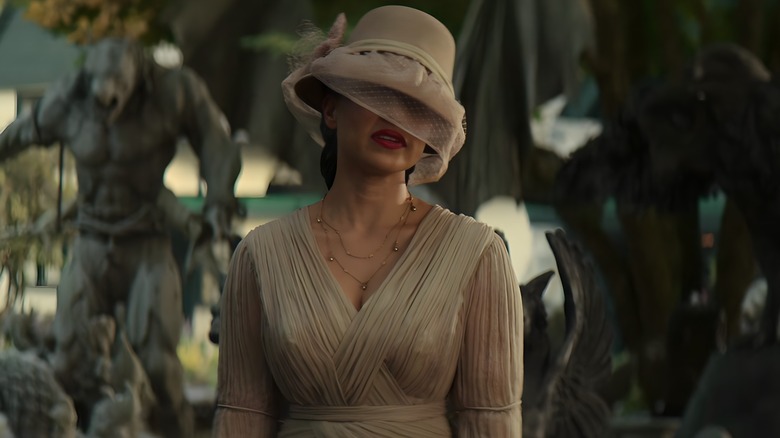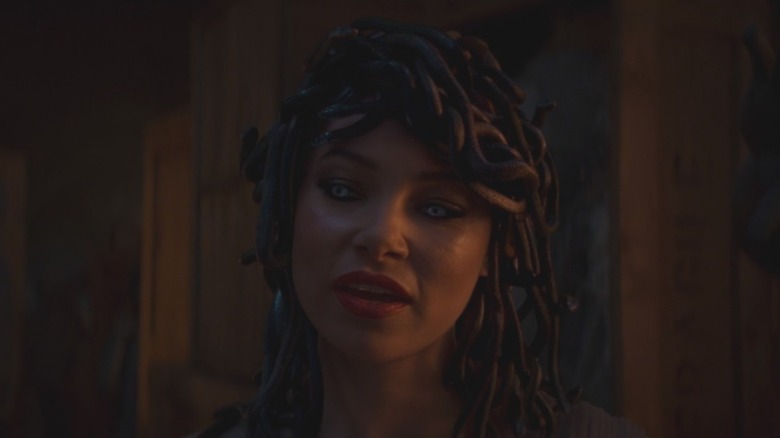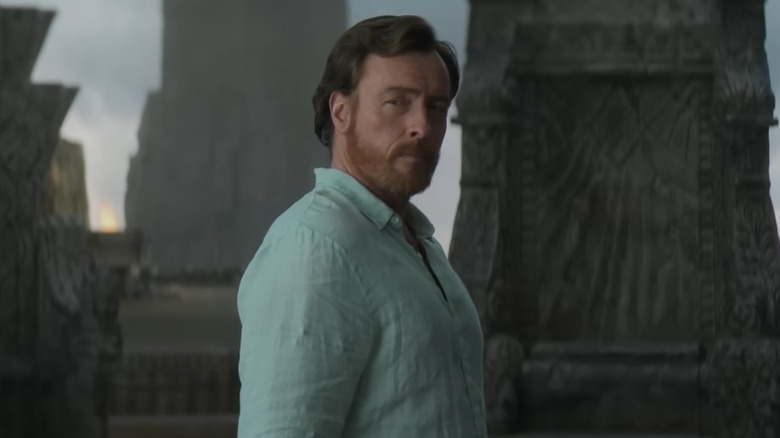The Real Reason Athena Cursed Medusa Is Darker Than Percy Jackson Fans May Think
The following article includes topics of sexual assault and rape
Season 1, Episode 3 of Disney+'s live-action adaptation of Rick Riordan's book series "Percy Jackson & the Olympians," titled "We Visit the Garden Gnome Emporium," sees Percy Jackson (Walker Scobell) and his quest companions encounter Medusa (Jessica Parker Kennedy) hidden away in a nameless New Jersey forest. The sequence takes a notable turn from the source novel, which depicts "Aunty Em" as an unrepentant monster Hades-bent on petrifying anyone foolish enough to wander across her home. The Disney+ series, however, depicts Medusa as a more three-dimensional character with stronger allusions to her tragic history.
During a conversation with Percy, Annabeth Chase (Leah Sava Jeffries), and Grover Underwood (Aryan Simhadri), Medusa explains, "Athena was everything to me. I worshipped her; I prayed to her; I made offerings. She never answered, not even an omen to suggest she appreciated my love ... I would have worshipped her that way for a lifetime: in silence. But then one day, another god came, and he broke that silence ... The sea god told me that he loved me. I felt as though he saw me in a way I had never felt seen before. But then Athena declared that I had embarrassed her and I needed to be punished. Not him. Me. She decided that I would never be seen again by anyone who would live to tell the tale."
According to Greek mythology, Athena cursed Medusa after discovering the mortal with Poseidon (portrayed by Toby Stephens on the Disney+ series) inside one of her temples. Worse still, most versions of the myth suggest that the sea god raped Medusa, and Athena, powerless to punish another god, unleashed all her wrath upon the victim, transforming her hair into a tangle of poisonous snakes.
The PJO artistic team chose to give Medusa a voice
In the Disney+ version of "Percy Jackson & the Olympians," Medusa's story still ends with her decapitated head in a box, but the reasoning for each decision that leads to her death is different, and that's because Riordan, along with every other voice in the artistic team for the adaptation, felt that Medusa deserved a second chance at a better story. The changes are seeded as early as Season 1, Episode 1, "I Accidentally Vaporize My Pre-Algebra Teacher," where Sally Jackson (Virginia Kull) cautions her son, "Not everyone who looks like a hero is a hero, and not everyone who looks like a monster is a monster." To drive matters home, this conversation is had in the presence of a statue of Perseus holding Medusa's severed head.
During a 2023 interview with Variety, Riordan — who co-created the Disney+ series and serves as one of its many executive producers — acknowledged that the shift was designed to shine a more direct light upon any potential foul play. "There are many versions from ancient times of what happened in that temple," said Riordan. "Who's to blame? Who's the abuser? What's the real story? It's fiction, but it certainly is important to acknowledge that there is abuse involved here. Abuse of power."
For her part, Jessica Parker Kennedy approached Medusa with concrete certainty regarding Poseidon's actions. Citing showrunner Jonathan E. Steinberg's writing as being crystal clear, she said. "I chose to play that she was a victim of rape and total abandonment, not understanding why Athena would turn on her." There's no mistaking that Medusa still channels her trauma into cruelty, and that's made abundantly clear in the scenes that follow.
Medusa's voice allows bigger questions about Poseidon's actions
While Percy Jackson is never close to his father in Rick Riordan's novel series, he either lets go of his frustrations with Poseidon or forgets them quickly. Rebecca Riordan, the author's wife, who also serves as one of the Disney+ series' many executive producers, believes maintaining focus on the subject decentralizes the potential patriarchal lens. After assuring Variety that one of the writing team's top priorities was to give Medusa better narrative care, she said, "The studio execs were like, 'Oh, this is going to be a story about Percy gaining his father's love and respect?' And it's like, 'No, that's not the story!' He has to go through: 'What has my father done? Has he changed? How do I see myself in relationship to that?'"
With this in mind, Rick Riordan promised a stronger focus on the sea god's actions regarding his son and Sally Jackson. "Percy can only judge his father by the wreckage he left behind," he said. "There's a third act to that subplot of Medusa and Poseidon and Sally that you haven't [seen] yet. It comes in Episode 7, a really powerful flashback scene where you see Sally and Poseidon together." Considering how the novel series already sees Percy hold the gods accountable for their bad behavior, it's only right that an author famous for always trying to be better would expand that concept into every aspect of his work.
If you or anyone you know has been a victim of sexual assault, help is available. Visit the Rape, Abuse & Incest National Network website or contact RAINN's National Helpline at 1-800-656-HOPE (4673).


